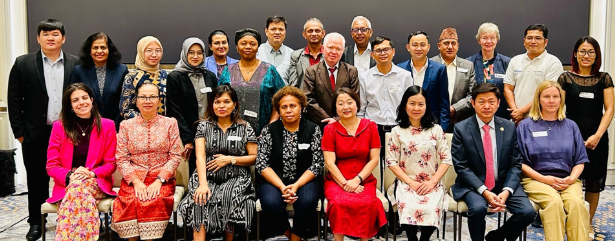SUN Countries in Asia take steps to improve food labelling
There are many ways that food systems transformation can contribute to ending malnutrition. On the production side, agriculture and fisheries are critical to food production and availability. However, trade and market reform ensure that nutritious food gets from farm to table.
One critical factor that is often overlooked is food and nutrition labelling, which helps ensure that a product’s contents are accurately explained and that consumers have the information they need to prepare the product safely. Good labelling can be effective in preventing overweight and obesity by ensuring that consumers have easy access to a food product’s nutritional content (or lack thereof).
"Effective nutrition labelling, including front-of-pack labelling has been identified as one of the strategies that countries should use to address the growing global concern of unhealthy diets" says the World Health Organization (WHO).
But ensuring accuracy in food and nutrition labelling is often easier said than done.
“With the increase in global trade and a shift away from the traditional face-to-face food producer and buyer relationship,” says the Food and Agriculture Organization of the United Nations (FAO), “there is a greater need to create food labels that are clear and can be trusted.”
To that end, the Scaling up Nutrition (SUN) Movement hosted an interactive peer-to-peer learning event on food labelling from 22–24 April in Bangkok, Thailand.
Representatives from eight SUN Countries in the region (Cambodia, Indonesia, the Lao People’s Democratic Republic, Myanmar, Nepal, Sri Lanka, Timor-Leste and Viet Nam) attended the event to learn from experts and peers about food labelling practices they could apply and adapt to their own countries.

Attendees – including SUN Focal Points and representatives from government agencies – learned of regulatory frameworks and guidelines for food and nutrition labelling. They also had a chance to share experiences from their own countries related to good practices and challenges with food and nutrition labelling. During the event, the French Special Envoy for Nutrition for Growth (N4G), Mr. Brieuc Pont, shared plans for the upcoming 2025 N4G Summit in Paris, noting the opportunity to address food labelling experiences at the event.
Finally, each country left the event with a specific and actionable road map they can use to improve their food and nutrition labelling practices and bring them in line with global standards, as needed. The SUN Movement Secretariat Asia Hub will follow up with each country in the coming months to track their progress and ensure that any technical assistance needs are being met.
The event was made possible by support from Capacity for Nutrition, a joint action co-funded by the European Union (EU) and the German Federal Ministry for Economic Cooperation and Development (BMZ), implemented by the German development agency Deutsche Gesellschaft für Internationale Zusammenarbeit (GIZ). Capacity for Nutrition in 2023 established support for the SUN 3.0 Strategy (C4N-SUN).